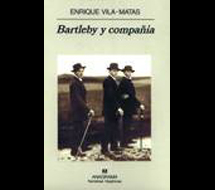 "The glory or merit of some men is to write well, the other is not to write": Jean De La Bruyere
"The glory or merit of some men is to write well, the other is not to write": Jean De La Bruyere Maria Jimena Duzán
Bartleby syndrome (02 of January 2006)
Having survived the New Year, surely a final heroic act is even more pertinent to begin in 2006 recognizing that there is more daring feat in this modern world than being a writer. I am not referring to the "clerks", as the name of the implacable Roberto Bolaño in reference to the best writers Isabel Allende style sellers who have become his trade in a factory making stories as predictable as perishable, but real writers who do not compromise in its creation, which are not subject to the mercantilist argument that publishers needed today, most frantic literary awards in fiddle to the investments made in the fashion writers, who publish literary daring.
My tribute goes to those writers who do not belong to the great literary circuit, they have written their works without agents, which are not to win any of these business awards and yet still dazzle with their stories. I mean a Fernando Vallejo, rigorous in its mission a writer, a William Ospina, a poet who can not live the poetry, I venture, had to do the same as Roberto Bolaño, another poet who lost for lack of funds, and delved into the novel with the fortune of written a story like Ursúa, its 51 years, or as Bolaño himself, who never lost the northern literary or discouraged by the fact that his work was recognized by publishers, as it is after his untimely death. Again, life was a successful writer and Seix Barral refused to publish at the time his first novel (The Savage Detectives).
Not to mention Colombian writers, perhaps less known, such as Julio Paredes, Hugo Chaparro, Enrique Serrano, Gonzalo Mallarino, Antonio Ungar or Carolina Sanin silent disciples of another great writer, Catalan Enrique Vila-Matas, little known in these latitudes, but considered a cult author of a whole new generation of American writers like Cesar Aira, Juan Villoro, Rodrigo Fresán or our Héctor Abad.
Vila-Matas
always so bold, has dared to make a book to explain the syndrome of "Bartleby." A literary disease takes its name from a character who appears in a story by Herman Melville, a drab office who has never gone anywhere, that nobody knows whether coming or going, or whether or not relatives in this world only knows that when someone asks you to tell them about his life, always respond with this phrase, as emblematic of these creatures living in deep denial of the world: "I would prefer not to.
always so bold, has dared to make a book to explain the syndrome of "Bartleby." A literary disease takes its name from a character who appears in a story by Herman Melville, a drab office who has never gone anywhere, that nobody knows whether coming or going, or whether or not relatives in this world only knows that when someone asks you to tell them about his life, always respond with this phrase, as emblematic of these creatures living in deep denial of the world: "I would prefer not to.
There are many writers who have stopped publishing after having written only one work or two, as with Rimbaud, who wrote his only play at 19 years, or as Juan Rulfo, who after Pedro Páramo and Llano engulfed in flames in silence. In the case of Rimbaud, Vila-Matas has his passion for writing ended when he ran his hallucinations. Rulfo And when asked why he had stopped writing, he always He blamed the death of his uncle Celerino, which he said was he was telling stories. Other writers who could not be rewritten, not so lucky. Many ended up in the asylum, if not the living dead.
Here in Colombia, a typical case of Bartleby's syndrome is relatively recent, is that of Antonio Caballero, who after writing a novel peak (no choice), he has not post any. And when Knight asked why one has written a novel, answers with this phrase, feature writers always passing through the maze of no: "Because the novel was actually an excuse to write a poem.
To all those writers heroes of this time my best wishes.
0 comments:
Post a Comment